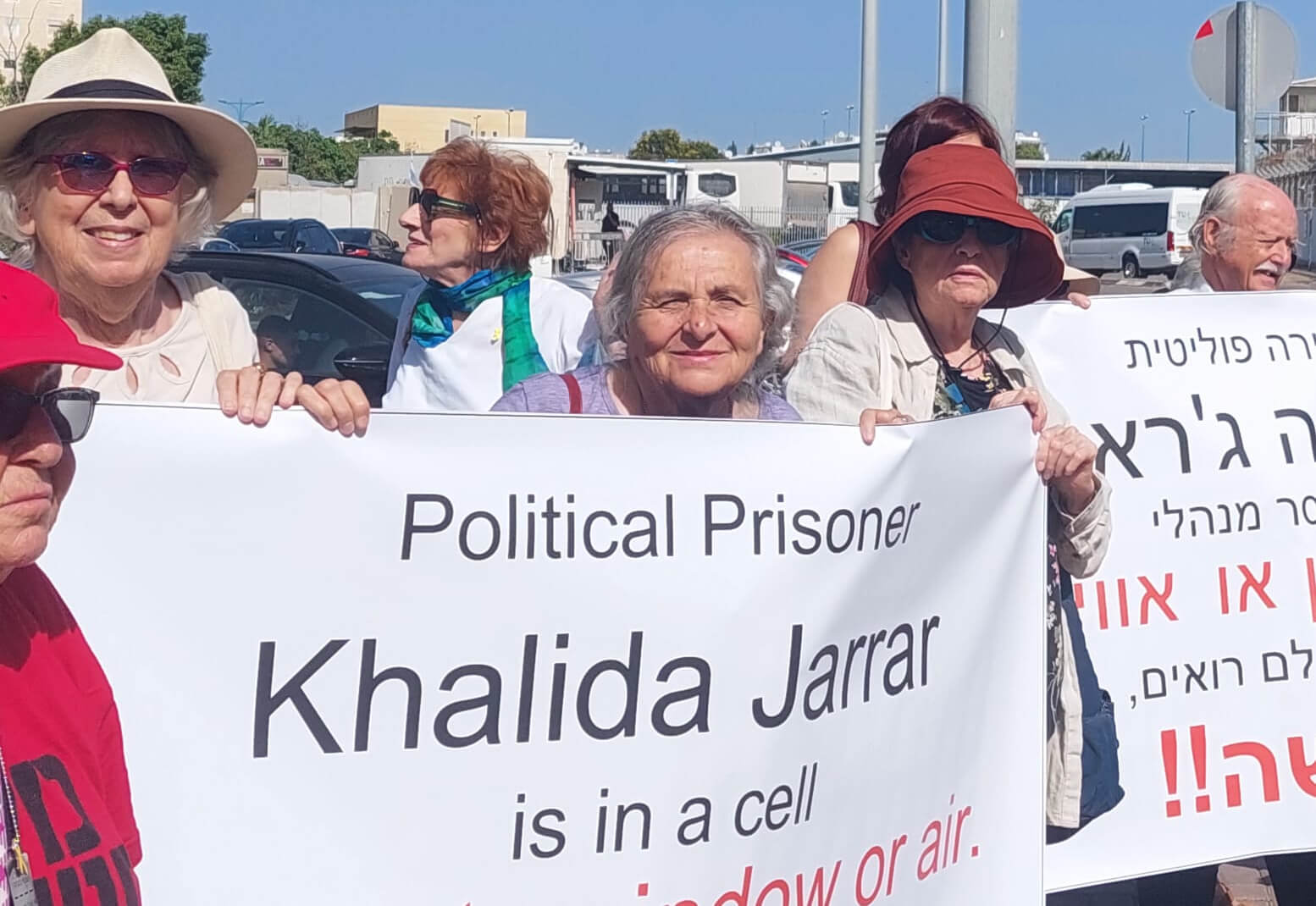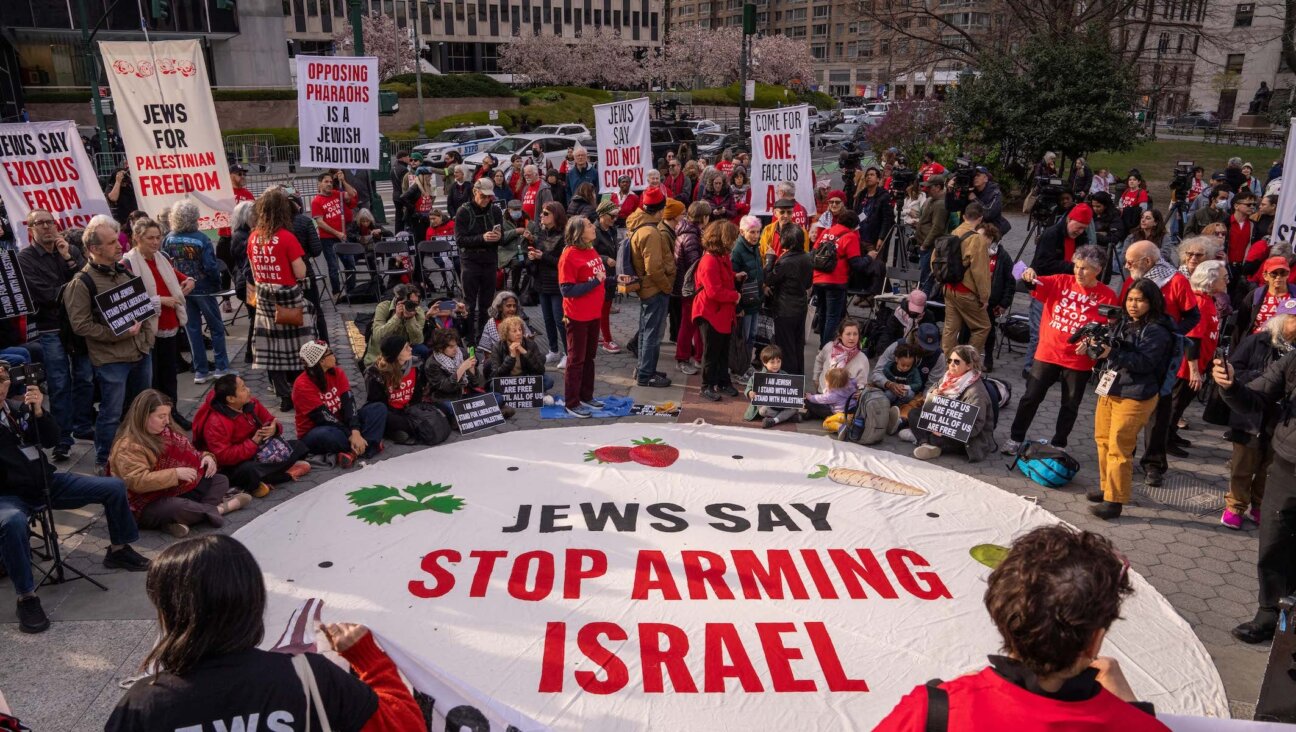I’m a Holocaust survivor. Here’s why I celebrated my 80th birthday protesting at an Israeli prison
I learned early on how essential it is to treat all human lives as sacred

Veronika Cohen protests outside Neve Tirza prison, where Israel has indefinitely detained Palestinian legislator Khalida Jarrar. Courtesy of Veronika Cohen
Shortly before my 80th birthday in September, I came across an article by Gideon Levy of Haaretz about the Palestinian political prisoner Khalida Jarrar. Jarrar is a Palestinian legislator whom Israel is holding in administrative detention, meaning she has no chance to defend herself in court, nor is there an end date to her sentence. Her six-month detention can be indefinitely renewed.
I recognized her name. I remember how, while she was previously jailed in 2021, her 31-year-old daughter died suddenly, and Israeli authorities refused to let Jarrar attend the funeral. Israel’s cruelty in that matter predated the arrival of Itamar Ben-Gvir, the Kahanist who is now the minister of security, whose portfolio leaves him in charge of prisons as well as the police.
“Palestinian lawmaker Khalida Jarrar was arrested again after the war broke out and has been jailed ever since without charges, now in total isolation, in inhuman conditions,” wrote Levy.
Jarrar, a feminist politician in the Popular Front for the Liberation of Palestine, a faction in the Palestine Liberation Organization, was arrested on Dec. 26, in the West Bank city of Al-Bireh, near Ramallah. She has been kept in solitary confinement in a cell without a window — no air, no light. There’s a toilet in her cell with water only at certain hours of the day. What mind came up with this added cruelty?
Levy calls her a “prisoner of conscience,” and describes how she lies on the floor to search for some cracks through which a bit of air comes in.
One day in late August, I was in the midst of my morning prayers in my daughter’s peaceful backyard garden in Beersheba when the idea arrived as a command: “Do something that could help her.” Create enough noise to keep Jarrar’s case in the public eye.
A dear friend and I often talk about recognizing a job that has our name on it. This one had my name on it. But what could I do?
I decided to mark my 8oth birthday in front of Neve Tirza prison, where Khalida is being kept.
That would make for a story, I thought, and the world is hungry for stories that suggest hope.
I immediately panicked at the commitment I made to myself.
I will not be able to get anyone to join me, I thought. I will be standing there with two elderly friends, looking pathetic. What could I write on a poster that would get the message across and not annoy any participants? I don’t have contacts in the press anymore — how will we get some coverage? If I am interviewed, what if I say something inappropriate, doing more harm than good?
Add to all that the very real awareness that in today’s Israel, peaceful demonstrators get arrested. Do I want my friends’ arrests on my conscience?
The next day I sent out an invitation to friends in Israel and the United States.
“On Sept. 20th I will be 80 years old. I would like to show my gratitude for being alive by doing something that falls in the category of tikkun olam,” I wrote, using the Hebrew phrase for “repairing the world.”
By the time my birthday arrived, 15 of us stood in front of Neve Tirza prison. We managed not to get arrested.
Jarrar’s lawyer was able to let her know about our demonstration, which apparently brought her and her husband some hope, some relief.
We had help from an NGO contacting the press. A reporter identified me as a Holocaust survivor, since I was born in the ghetto in Budapest and miraculously survived.
The memory of the Holocaust is used and overused, and I remain conflicted about identifying myself as a survivor. Yet we are living through dark times, both in terms of what is done to us, and what we are doing to others. Such times demand that we reflect on evil, on the danger of losing sight of the sanctity of all human lives. The lessons of the Holocaust must inform our activism.
The times we are living through are horrific, and what is ahead may be catastrophic. Staring down the abyss, can we afford the luxury of advocating for one person subjected to torture? Can we afford not to?
On the door of our house is a sticker that says, “We want peace between Israel and Palestine, Each free and secure.”
The sign has been up for 35 years. We are not there yet, but we are not taking down the sign.
Miraculously, the glue still holds.
















